Triticum sp.Below you will find antibodies with confirmed or predicted reactivity to Triticum sp. Protocols and Technical Information • Support • Western Blot Video Tutorials |  |

AS12 2364 | Clonality: Polyclonal | Host: Rabbit | Reactivity: A. thaliana, B. oleracea, S. lycopersicum, L. luteus
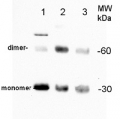
AS12 2110 | Clonality: Polyclonal | Host: Rabbit | Reactivity: L. sativa, P. sativum, S. lycopersicum, Z. mays

AS09 487 | Clonality: Polyclonal | Host: Rabbit | Reactivity: A. thaliana, J. curcas, P. nigra, P. trichocarpa, R. sativus

AS09 487-HRP | Clonality: Polyclonal | Host: Rabbit | Reactivity: A. thaliana, J. curcas, P. nigra, P. trichocarpa, R. sativus




AS09 487B | Clonality: Polyclonal | Host: Rabbit | Reactivity: A. thaliana, J. curcas, P. nigra, P. trichocarpa, R. sativus

AS09 487-ALP | Clonality: Polyclonal | Host: Rabbit | Reactivity: A. thaliana, J. curcas, P. nigra, P. trichocarpa, R. sativus

AS23 4898 | Clonality: Polyclonal | Host: Rabbit | Reactivity: Zea mays, Brachypodium distachyon, Hordeum vulgarem, Oryza sativa, Sorghum bicolor, Triticum
Interested to receive a free sample for testing? Contact us.

AS08 321 | Clonality: Polyclonal | Host: Rabbit | Reactivity: PHT1-1 and 1-2 isoforms in Hordeum vulgare
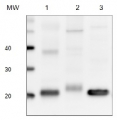
AS08 330 | Clonality: Polyclonal | Host: Rabbit | Reactivity: A. thaliana, B. rapa subsp. chinensis, C. reinhardtii, E. crus-galli, Euglena sp., H. pluvialis, N. tabacum, P. miliaceum, P. sativum, S. oleracea, Synechococcus PCC 7942, Synechocystis sp. PCC 6803, Thalassiosira guillardii, Z. mays
Benefits of using this antibody
50% discount on matching standard/positive control
AS08 330S PetC | Positive control/quantitation standard
Use promotional code: Stand50
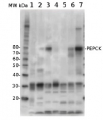
AS07 241 | Clonality: Polyclonal | Host: Rabbit | Reactivity: [global antibody] for plants Ananas comosus, Miscantus giganteus, Mouse, Nannochloropsis oceanica, Oryza sativa, Panicum maximum,, Panicum virgatum, Phaseolus vulgaris, Saccharum spp. hybrid clone C91-301, Spartina alterniflora, Spartina patens, Zea mays
Benefits of using this antibody

AS09 458-HRP | Clonality: Polyclonal | Host: Rabbit | Reactivity:A. comosus, A. thaliana, S. PCC 6803, Ch. velia, H. vulgare, J. curcas, Lupinus sp. , M. crystallinum, N. tabacum, O. sativa, Saccharum spp. hybrid clone C91-301, S. laricifolia, Z. mays, Synechocystis sp. , P. tricornutum (strain CCAP 1055/1), T. weissfloggi
Benefits of using this antibody




AS09 458B | Clonality: Polyclonal | Host: Rabbit | Reactivity:A. comosus, A. thaliana, S. PCC 6803, Ch. velia, H. vulgare, J. curcas, Lupinus sp. , M. crystallinum, N. tabacum, O. sativa, Saccharum spp. hybrid clone C91-301, S. laricifolia, Z. mays, Synechocystis sp. , P. tricornutum (strain CCAP 1055/1), T. weissfloggi
Benefits of using this antibody

AS09 458-ALP | Clonality: Polyclonal | Host: Rabbit | Reactivity:A. comosus, A. thaliana, S. PCC 6803, Ch. velia, H. vulgare, J. curcas, Lupinus sp. , M. crystallinum, N. tabacum, O. sativa, Saccharum spp. hybrid clone C91-301, S. laricifolia, Z. mays, Synechocystis sp. , P. tricornutum (strain CCAP 1055/1), T. weissfloggi
Benefits of using this antibody
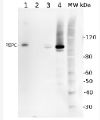
AS09 458 | Clonality: Polyclonal | Host: Rabbit | Reactivity: A. comosus, A. thaliana, C. ciliaris, C. gayana, C. velia, Ch. quinoa, H. vulgare, J. curcas, K. prostrata, L. fusca, Lupinus sp. , M. maximus, M. crystallinum, N. tabacum, O. sativa, P. antidotale, P. coloratum, P. strobus, Saccharum spp. hybrid clone C91-301, S. lanata, S. laricifolia, S. bicolor, Synechocystis PCC 6803, Phaeodactylum tricornutum (strain CCAP 1055/1), T. weissfloggi, Z. mays, Z. muelleri
Benefits of using this antibody
50% discount on matching standard/positive control
AS09 458S PEPC | Phosphoenolpyruvate carboxylase positive control/quantitation standard
Use promotional code: Stand50

From the laboratory of Paul Knox, Phd, University of Leeds, United Kingdom
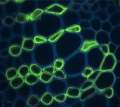
From the laboratory of Paul Knox, Phd, University of Leeds, United Kingdom

From the laboratory of Paul Knox, Phd, University of Leeds, United Kingdom

From the laboratory of Paul Knox, Phd, University of Leeds, United Kingdom

From the laboratory of Paul Knox, Phd, University of Leeds, United Kingdom

From the laboratory of Paul Knox, Phd, University of Leeds, United Kingdom

From the laboratory of Paul Knox, Phd, University of Leeds, United Kingdom

From the laboratory of Paul Knox, Phd, University of Leeds, United Kingdom

